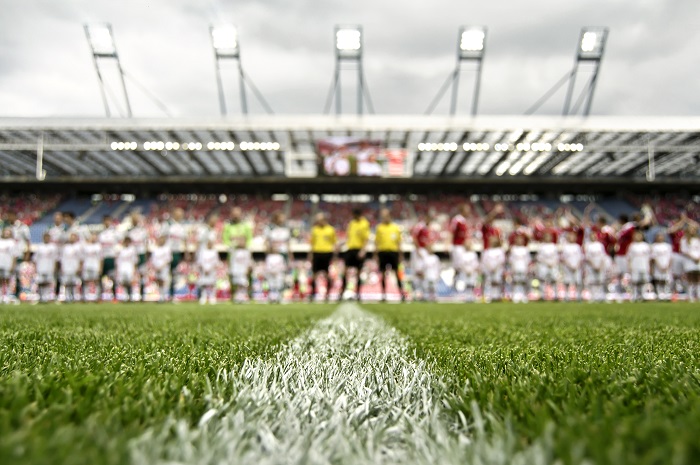Arsenal Football Club is a top-flight English club based in Islington, London. The club started in 1886 under a different name but soon became the Arsenal you know today. Find out more about the club from their first days to the club they are today in this article.
About Arsenal FC
Arsenal are one of the most successful clubs in England, specifically third when it comes to the number of titles. The idea behind the club came from fifteen fellow munitions workers. The workers of the Royal Arsenal Factory in Woolwich organised the club under a different name in 1886. Arsenal’s nickname, the Gunners, derives from their origins and is a suitable epithet.
Today, they are still one of the top clubs in the Premier League. In their trophy cabinet, you will find 47 trophies. So how did they come such a long way and become one of the most popular clubs worldwide? Let’s find out by starting from the first days of the club.

Early History
As mentioned earlier, the club was created in 1886 by a bunch of Royal Arsenal munitions factory workers. However, the club was originally formed by David Danskin and his coworkers under the name Dial Square Football Club. The name originated after the workshop in the heart of the Royal Arsenal facility.
However, the name didn’t hold long, as the club changed their name to Royal Arsenal in January 1887. Their first home ground was Plumstead Common, but they spent most of their time playing at the Manor Ground.
In its first years, the club won several trophies, such as the Kent Senior Cup and the London Charity Cup. These are the only county association trophies of the club. Finally, in 1891, Royal Arsenal became the first London club to go professional.
After going onto the professional scene, the club had another name change, as they renamed to Woolwich Arsenal. They started in the Second Division and advanced to the First Division in 1904.
However, despite the promotion, the club was in severe financial trouble for years. Finally, the club went bankrupt in 1910. In 1913, they went back to Second Division and moved to the new Arsenal Stadium in Highbury.
After a controversial promotion to the First Division, things were looking brighter for the club. Soon, they began dropping the ‘The’ from their name and became the Arsenal we know today.

Bank of England Club: Herbert Chapman Years
The new home and playing in the First Division were just the boost the club needed. However, it was the influence of Herbert Chapman, who took over as manager in 1925, that revolutionised the club. You can say that Chapman built an entirely new Arsenal.
In this period, Arsenal won their first FA Cup in 1930 and League Championships in 1930 and 1932. After Chapman’s tragic death in 1933, Joe Shaw and George Alisson continued the good work. However, after their reign, the club went into a slow decline up until 1996.
Arsene Wenger Era
The Arsene Wenger years are the most prolific years of the club. Wenger’s career was defined by money efficiency and transfers, fitness practices, attacking football, etc. By bringing in players from his homeland, such as Thierry Henry and Patrick Vieira, Wenger won numerous trophies.
Some of the notable trophies from Wenger’s period are the following:
- Three Premier League Titles (1997, 2001, 2003)
- Seven FA Cup Trophies (1997, 2001, 2002, 2004, 2013, 2014, 2016)
- Seven Community Shield Titles (1998, 1999, 2002, 2004, 2014, 2015, 2017)
While Wenger’s Arsenal didn’t win any European trophies during his tenure, they reached the finals of the 2015 Champions League. Their run was stopped near the summit, as they lost to Barcelona (2:1) in the finals.
Wenger’s success was mainly around domestic competitions. His dominance was displayed the most in 2003 when they earned the title of The Invincibles. To this day, many consider this to be the best Premier League team ever. Arsenal broke the record for the most unbeaten games run at the time.
They won the Premier League without a lost game. Their winning streak started on the 7th of May, 2003, and ended on the 24th of October, 2004. Arsenal went on a streak of 49 unbeaten games, which to this day remains the national record.
Stadium History: From Highbury to Emirates
In summary, Arsenal, as we know them today, had a few home grounds in their history. Their original stadium was Plumstead Common. However, they spent the majority of their time at the Manor Ground in Plumstead. Between 1890 and 1893, they played at the Invicta Ground.
Finally, in 1913, when they moved, their stadium was the Arsenal Stadium, or Highbury as many know it. The stadium was their home ground for over 90 years before they finally moved to the Emirates Stadium.
While the stadium was renovated several times in its long history, it couldn’t accommodate the football boom at the time. The capacity of the stadium was around 57.000 until the renovation. Highbury had to be converted to an all-seater stadium due to Premier League regulations, reducing its capacity to 38.419.
This is when the idea behind the Emirates first popped up, around 2000. The idea was to build a high-capacity stadium in Ashburton Grove which could hold around 60.000 fans. After some issues, the construction was complete in June 2006.
The name of the stadium comes from the sponsors, Emirates Airlines. The stadium stands are the North Bank, Clock End, East Stand, and West Stand. The official capacity of the stadium is 60,704.
Post Wenger Struggles
Despite not having a lot of achievements in international football, Arsenal prospered under Arsene Wenger. While the final years of the French manager were not quite the best, it was even worse once he left. Arsene Wenger departed Arsenal in 2018.
Unai Emery came after Wenger and became the head coach in May 2018. In his first season, Arsenal finished the Premier League in 5th place. The same season, they reached the Europa League finals, where they lost 4:1 to Chelsea.
While we can’t say Emery’s season was a disaster, it was not quite what everyone expected. The club let Unai Emery go as manager and took Freddie Ljunberg as interim head coach.
Finally, Mikal Arteta took over as the new head coach on the 20th of December 2019. Soon after, the club changed Arteta’s position from head coach to manager. Many consider Arteta to be the figure Arsenal needs. And he certainly has brought the club to the heights it deserves.
Rivals and Derbies
Coming from London, Arsenal expectedly has a lot of neighbouring rivalries. Their longest and deepest rivalry is with the neighbouring Tottenham Hotspurs. You might know the derby as the North London Derby. It is one of the fiercest derbies in English football.
At the same time, Arsenal also has a West London Derby against Chelsea. As both are very prominent clubs of the Premier League, expectedly, the derbies are notorious for their ferocity.
Encompassed from all sides, Arsenal also rivals Crystal Palace, familiar as the South London Derby. While it is not as popular as the North London Derby, it is still quite important to Arsenal fans.
Lastly, while it is not a city derby, a special kind of rivalry exists between Arsenal and Manchester United. The rivalry dates back to when both clubs were competing for the Premier League title in the 2000s.
Arsenal Today
After taking over in 2019, Mikal Arteta is progressing slowly and improving the situation in the club. In the first season, he finished 8th, which is the lowest finish since 1994/95. However, Arteta managed to secure another, and the club’s 14th FA Cup trophy that year.
The next season was another struggling period for the club and Arteta, but there were signs of improvement. In 2021, they finished in 5th place, and got a spot in the Europa League. However, this was still not the best Arteta could do at the club. His biggest success would come next season.
In 2021, many thought Arsenal could go all the way in the Europa League. After a successful Group Stage, Arsenal started to struggle in the playoffs. Namely, after the draw against Sporting away, it should have been an easy win at home. However, Sporting surprised them and dropped them from the competition after a penalty shootout in London.
(Un)Successful 2023 Premier League Season
Arsenal’s most successful season in the Premier League recently was the 2022 season. The Gunners started the season quite successfully, winning almost all their games. Many thought the club resembled the 2003 Invincibles crew. However, at the finish line, the dream started to crumble.
Arsenal lost a few crucial games, including their game against their biggest rival for the championship, Manchester City. The loss against the Citizens was the final nail in the coffin for the Gunners, as they practically lost the title at that point.
In the end, after chasing Arsenal the entire season, the defending champions Manchester City managed to keep the throne. It was a devastating outcome for Arsenal after having the lead the entire season.
Nonetheless, Arsenal should be happy with what they have achieved this season. After years of struggle, they have finally reached the top of the Premier League table. They are once again the competitive club they were once. Moreover, second place on the Premier League table comes with great rewards.
Mikel Arteta: Back in the Champions League
Despite failing to secure the Premier League title, Arsenal finished the season with an even more important prize in their hands. Namely, by finishing second, Arteta’s team are finally back in the highest European competition, the Champions League.
Arsenal have been longing for the day they return to the strongest football competition in Europe and worldwide. The second place on the Premier League table, however disappointing, comes with a great honour.
While we are yet to see how the Gunners will fare against the strongest clubs in Europe, they are definitely on the right track. The upcoming season guarantees to be a success for the club. They have the players, the mindset, the funds, and everything they need to compete once again in the strongest international competitions.















